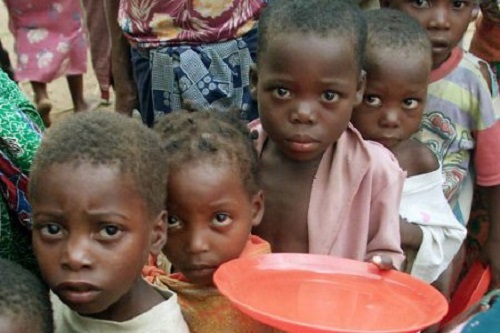Filipe Moreira photo
By
Alpha Jallow/FAO
Adverse climatic conditions, a slow global economy and conflicts are key factors driving food insecurity in the region
The number of undernourished people in sub-Saharan Africa has increased mainly due to the impact of conflict and climate change with the situation pointing to the urgent need to build affected communities’ resilience and to find peaceful solutions that strengthen food security, the UN’s Food and Agricultural Organization (FAO) stated.
The prevalence of chronic undernourishment appears to have risen from 20.8 to 22.7 percent between 2015 and 2016, according to FAO’s Africa Regional Overview of Food Security and Nutrition report (2017).
“The number of undernourished people rose from 200 to 224 million, accounting for 25 percent of the 815 million people undernourished in the world in 2016,” said Bukar Tijani, FAO Assistant Director-General and Regional Representative for Africa.
“Major factors have caused this surge in hunger: the proportion of the population that has experienced severe food insecurity because of their inability to access food has risen in the region; as well, adverse climatic conditions and conflict, often occurring concurrently, are key factors driving the recent increase in food insecurity in the region,” Tijani explained.
This year’s report, which features the theme: “The Food Security and Nutrition – Conflict Nexus: Building Resilience for Food Security, Nutrition and Peace” was launched at the joint FAO/WHO Africa Regional Symposium on Sustainable Food Systems for Healthy Diets and Improved Nutrition, taking place in Abidjan last week.
The report indicates that during the first decade of the millinium, sub-Saharan Africa made sound progress in the fight against hunger with the prevalence of undernourishment falling from 29.1 percent to 20.6 percent. However, this was followed by a period of no progress with a worsening of conditions in 2015 and 2016 in many countries. This was mainly due to the impact of conflict and adverse climatic conditions such as repeated droughts – often linked to the El Niño phenomenon – resulting in poor harvests and the loss of livestock.
The hunger-conflict nexus
In sub-Saharan Africa, the majority of the undernourished population in 2016 live in countries affected by conflict. The prevalence of undernourishment is about twice as high in conflict-affected countries with a protracted crisis than in countries not affected by conflict, and nutrition outcomes are also generally worse in these countries.
A majority, or 489 million, of the 815 million people in the world that were undernourished in 2016 live in countries struggling with conflict, violence and fragility.
Although the frequency of wars has decreased over the decades, there has recently been a surge in the number of violent conflicts and conflict-related deaths. Over one third of the world’s highly violent conflicts took place in sub-Saharan Africa and of 19 conflict-affected countries in protracted crises, 13 are in sub-Saharan Africa.
Building household resilience
The FAO report identified a range of pathways through which support to food security and livelihoods can also help build resilience against conflict and contribute to sustaining peace. Given the complexity of conflicts and the conflict-food insecurity nexus, which climate change may amplify, a sustainable impact of food security and nutrition-related interventions on peace is more likely when implemented as part of a broader, multisectoral set of interventions before, during and after conflicts.
The report notes how many countries have developed or are developing policy frameworks and investment plans that are alignedwith the goals of the Malabo Declaration and SDG 2. And this requires adequate funding, setting the right priorities and strengthening institutional capacities.
The Malabo Declaration
Through the 2014 Malabo Declaration, African leaders reaffirmed the principles and values of the Comprehensive Africa Agriculture Development Programme (CAADP) and recommitted their countries to end hunger and halve poverty by 2025, boost intra-African trade, and enhance the resilience of livelihoods and production systems to climate change and other shocks.
Alpha Jallow
Alpha is a freelance journalist from Dakar, Senegal, having worked for the BBC African Radio service, West Africa Democracy Radio (WADR) and Radio France Internationale (RFI).



No Comments Yet!
You can be first to comment this post!